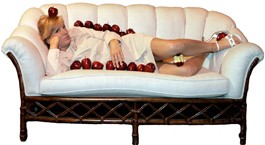Photograph by Jeff Thomas
Couch Apple: Danielle Thys portrays Lane,a wife who gets dumped.
By David Templeton
Ice cream is what God eats when he’s tired. It is better to die standing up than lying down. The perfect joke makes you forget about your life, and can best be described as being somewhere between an angel and a fart. These are just a few of the many unexpected and delightful revelations in Sarah Ruhl’s delicious 2004 Pulitzer-nominated play The Clean House, a comedy-drama that is so fresh and funny and creative and moving, it seems impossible that I’ve never heard of it until now.
With Cinnabar Theater’s pitch-perfect new production, solidly directed by actress Tara Blau, Cinnabar launches its new season with a big, beautiful bang, assembling a first-rate cast to populate Ruhl’s clever exploration of love, death, laughter and housecleaning. Inventively structured and packed with surprises, the play blends magical realism and dreamlike passages with dialogue that is simultaneously fresh, coarse, inspiring and amusing.
Lane (Danielle Thys) is a brilliant surgeon with two major problems, one she knows about and one of which she is not yet aware. As she states in her opening monologue, “My cleaning lady got depressed and stopped cleaning my house. I was, like, clean my house!” That’s problem number one. Number two, her lost-boy surgeon husband, Charles (Tim Kniffin), is about to leave her for a much older woman, a 62-year-old Argentinean mastectomy patient named Anna (Linda Ayres-Frederick), which will lead to twists that will make the whole clean-house thing moot.
But first, the housecleaner, Matilde (Juliet Tanner)—who would rather think up jokes in Spanish than clean house—will hire Lane’s neurotic, cleaning-fetish sister Virginia (Laura Jorgensen) to secretly clean the house in her stead, an arrangement that allows Virginia to burn off some pent-up frustrations, while giving Matilde time to daydream about her gag-loving mother and father, one of whom, we learn, actually died laughing. That notion of dying while laughing is central to Ruhl’s play, which consistently presents tragic or life-changing events in funny ways. There is so much wisdom and beauty in this script, one could imagine it becoming the source text for a new religion, one that puts laughter and kindness and an appetite for life on the altar instead of fear and dogma and strict adherence to the rules.
The beauty of Ruhl’s writing lies in the way she fits breathtaking ideas and phrases into otherwise straightforward moments, as in Virginia’s description of cleaning her home, filled with mentions of “tucking” household items away for the night and singing lullabies. On one hand, it’s pleasant dialogue, but on a deeper level, we see how Virginia has come to use cleaning as a substitute for raising children, which she wanted but never had.
Similarly, when a love-struck Charles attempts to justify his affair with Anna by borrowing concepts from Jewish mysticism, describing it as his sacred Jewish responsibility to leave Lane now that he’s found his soul mate (“You’re not Jewish,” Lane reminds him), it is both funny and heartbreaking on several levels at once.
The cast is impeccable, zigging easily from one-liners and comic collisions to some very difficult emotional moments, literally causing the audience to laugh and cry at the same time. Kniffin is given the most to do physically, from a remarkable pantomimed breast-cancer surgery to a trip through a now-filled Alaska in search of a tree to heal an ailing Anna, all performed with few props and yet perfectly realized. As Anna, Ayres-Frederick is believably ecstatic at finding love in the midst of fighting cancer, and is astonishingly detailed in the subsequent physical deterioration.
Tanner, as the matter-of-fact Matilde, is frequently mesmerizing, tossing off her lines with a sense of pleasure and delight that is infectious. And as the two sisters, Lane and Virginia, Thys and Jorgensen are remarkable, imbuing their characters’ emotional arcs with crystal-clear moments of realization and self-awareness as they learn what Anna and Virginia have always known—that life is not organized and cannot be planned out, that life is often at its best when it’s at its messiest.
‘The Clean House’ runs through Sept. 22.
Friday–Saturday and Sept. 20 at 8pm; Sept. 9 and 16 at 2pm.
Cinnabar Theater, 3333 Petaluma Blvd. N., Petaluma.
$20–$22.
707.763.8920.
Museums and gallery notes.
Reviews of new book releases.
Reviews and previews of new plays, operas and symphony performances.
Reviews and previews of new dance performances and events.











